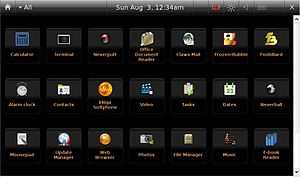Ubuntu Mobile
 | |
| Developer | Canonical Ltd. |
|---|---|
| OS family | Unix-like |
| Working state |
Discontinued. Succeeded by Ubuntu Phone |
| Source model | Open source |
| Latest release | 8.04.1 / 30 July 2008 |
| Available in | English |
| Platforms | Intel Mobile Internet Device (Expected) |
| License | Mainly GPL / Various others |
| Official website | www.ubuntu.com |
Ubuntu Mobile Internet Device Edition was an Ubuntu distribution planned to run on the Intel Mobile Internet Device platform, x86 mobile computers based on the Intel Atom processor. It was planned to use the GNOME framework Hildon as the basis for its GUI.
Equipment producers would have been able to customize their distributions, including options such as Flash, Java, or custom interfaces.[1]
Ubuntu Mobile has stopped development in 2009 and the successor Ubuntu for phones was announced on January 2, 2013.[2][3]
Functionality
According to Canonical, it would provide an uncompromised Web 2.0 experience: Web browsing, email, media, camera, VoIP, instant messaging, GPS, blogging, digital TV, games, contacts, dates/calendar, simple software updates will be available periodically.[1] Ubuntu Mobile Edition will only need a touchscreen device and a finger for navigation.
Release history
In June 2008, Ubuntu Mobile 8.04 was released.[4][5] Ubuntu Mobile ended active development after 9.10 Alpha 6.[6]
The development of Ubuntu Mobile has stopped, but Ubuntu continues to work on mobile distributions such as Kubuntu Mobile[7] or the ARM version of Ubuntu.
Since the October 2011 Ubuntu Development Summit (UDS), there is new mobile interface in active development. In 2014, Canonical plans to release Ubuntu for mobiles, tablets and televisions alongside already existing Ubuntu Desktop and Ubuntu Server. This means creating a universal interface, that would adapt its shape according to the device it runs on. Mark Shuttleworth, the founder of Canonical, said the interface is going to be based on Unity (actual desktop environment, developed by Canonical in 2010).
Kubuntu Mobile
Kubuntu Mobile is available for i386 and ARM platforms and uses the KDE Plasma Mobile.[8] Plasma Mobile is targeted at smartphones and small tablet devices that are mainly used via touch input. It is still being developed with the first stable release expected to be due in 2011, although individual KDE applications may be released earlier as part of the porting effort to MeeGo. Preview releases of the Kontact applications and a document viewer based on Calligra are already available.
Upcoming mobile version
Ubuntu has initially released an idea about a new mobile platform which would be competing with its fellow rivals Windows Phone, iOS and Android.[9][10]
See also
- Ubuntu Netbook Edition
- Ubuntu for Android
- KDE_Plasma_Workspaces#Mobile
- MeeGo
- Mer
- Tizen
References
- ↑ 1.0 1.1 Ubuntu Mobile Edition
- ↑ Ubuntu Phone OS Unveiled by Canonical | OMG! Ubuntu!
- ↑ Canonical unveils Ubuntu phone OS that doubles as a “full PC” | Ars Tehnica
- ↑ Canonical Blog » Blog Archive » Ubuntu MID Edition 8.04 achieves its first public release
- ↑ [Phoronix] Ubuntu Mobile 8.04
- ↑ Ubuntu Mobile Team Wiki
- ↑ kubuntu mobile.
- ↑ "Kubuntu 10.10". Kubuntu. Retrieved 7 August 2011.
- ↑ Ubuntu Mobile Preview at Axetue
- ↑ Official website
External links
- Ubuntu MobileAndEmbedded wiki
- Ubuntu Mobile Guide 7.10
- Mobile & Internet Linux Project by Intel
- Kubuntu-Mobile 11.04 (Natty Narwhal) preview mobile image
| ||||||||||||||||||||||||||||||||||||||||||||||||||||||||||||||||||||||
| ||||||||||
| ||||||||||||||||||||||||||||||||||||||||